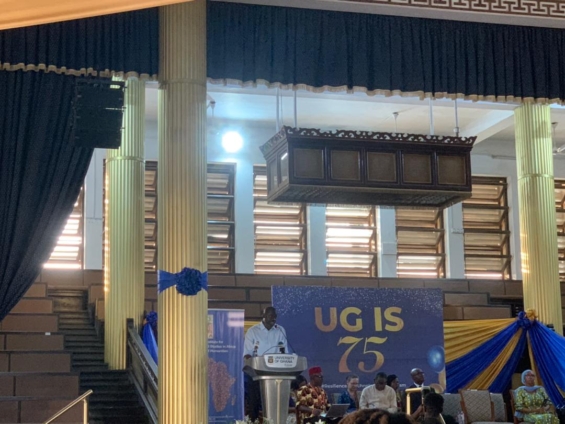A lecturer at Duke University, Professor Felwine Sarr, has called on the governments on the continent to invest in knowledge and innovation production within the education system as a crucial solution to address the social and economic challenges facing Africa.
The Senegalese writer and academician emphasized that many African governments tend to focus more on resolving immediate social and economic issues rather than prioritising long-term investments in knowledge production.

He highlighted the significance of such investment, stating that it would contribute to generating more intellectuals from tertiary institutions who could devise effective measures to tackle economic and social problems.
Speaking at the Anton Wilhelm Arno Lecture organised by the Department of Philosophy and Classics at the University of Ghana, Professor Felwine Sarr urged African leaders to recognise the importance of investing in knowledge production.
"The government has an important role to play in the pluralism of African knowledge. Africa has a lot of challenges, including education, health, and others, so most of the time they think that investing in knowledge is not urgent, so they respond to the needs, and knowledge comes later. It's a mistake because the investment in knowledge will allow them to respond to the needs appropriately," he said on Tuesday.

Prof Sarr further stressed that knowledge, particularly in areas such as innovation, technology, and material forms of knowledge, forms the foundation of economies.
He also highlighted the need for a broad understanding of knowledge, extending beyond traditional university and scientific domains.
He said, "They must know that the spheres of knowledge are the most important ones because economies are based on knowledge, innovation, technology, and material forms of knowledge. Also, the knowledge they have to consider should be wider than those in the universities and sciences. For instance, there is an ecological crisis that requires knowledge to adapt and respond to the African farmers and agriculture."
The lecturer also urged stakeholders in the education sector to integrate African knowledge across various domains into the curriculum of educational institutions.
"There is a lot of knowledge in different domains, which is psychological, environmental, and techniques that Africa has produced, and we need to put this knowledge in the curriculum, in courses like Maths, Sciences, humanities, and social science courses."
Latest Stories
-
Dr. Sodzi-Tettey appointed Ag. National Vaccine Institute CEO
4 minutes -
Livestream: Newsfile discusses Economic Dialogue, corruption fight land loot
28 minutes -
Fire engulfs 2 shops at Tudu, now under control
38 minutes -
Adongo appointed Finance Committee Chair as Parliament reeshuffles leadership
52 minutes -
Amin Adam, Gideon Boako lead Minority bench on Finance
1 hour -
If you don’t make time, you’ll never have time – Pastor Brian Amoateng urges Gen Zs
2 hours -
Pastor Brian Amoateng recounts how a gospel song inspired him to quit clubbing
2 hours -
Third edition of Women of Valour held in Paris
2 hours -
AMOSA 2000 organises health screening for host community
2 hours -
International Women’s Day 2025: DWM calls for urgent action to accelerate Gender Equality
2 hours -
Agalga, Ntim Fordjour lead Parliament’s Defence & Interior Committee
3 hours -
MTN Ghana champions women’s empowerment at National Women’s Summit 2025
10 hours -
Volta Council of State rep donates motorcycles to support journalists in the region
11 hours -
Cabinet approves construction of second gas processing plant
12 hours -
Whitray Junior Tennis Open 2025 begins in Accra
13 hours

